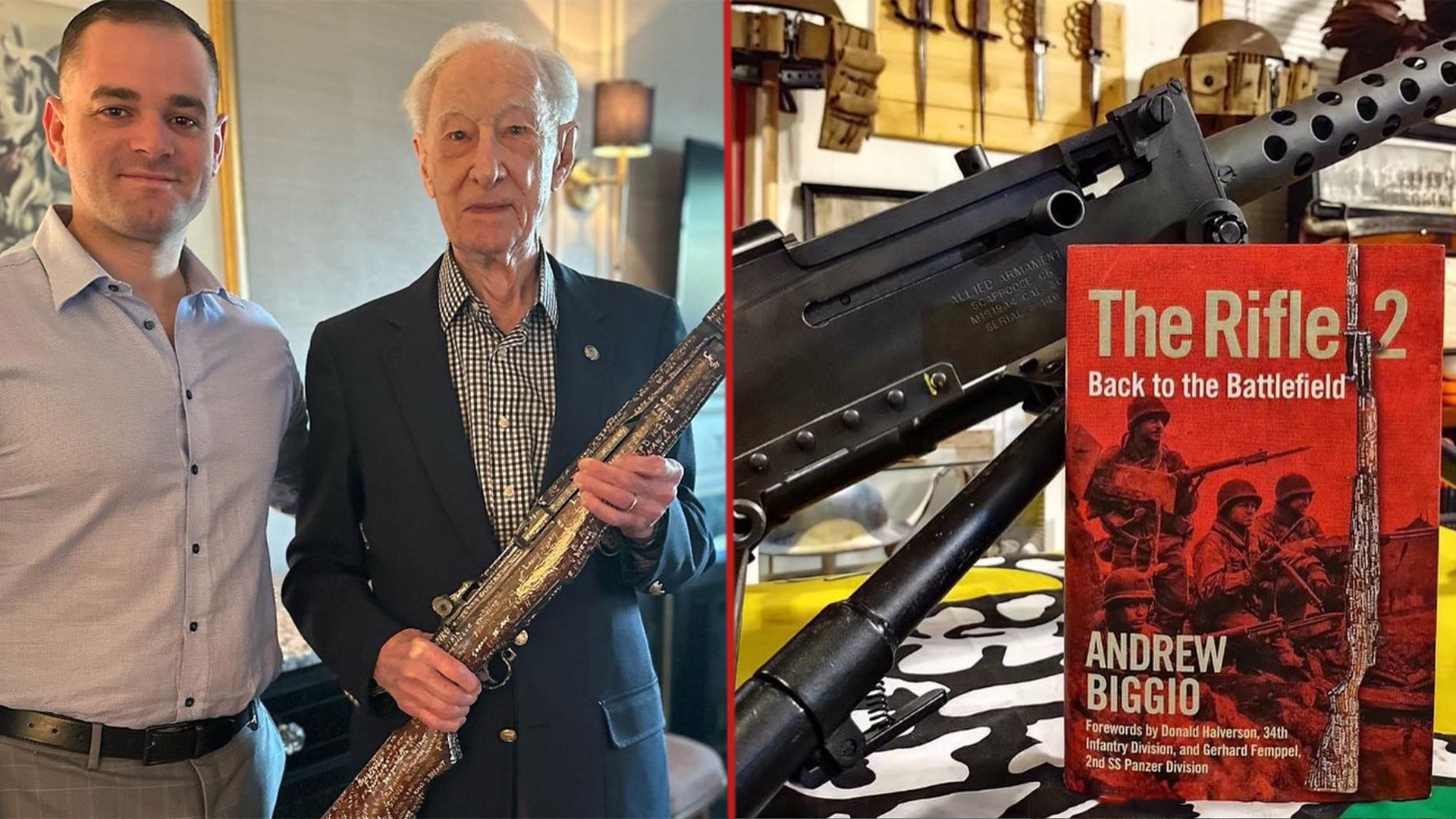

Andrew Biggio’s mission didn’t end when he came home from Afghanistan as a 28-year-old battle-hardened Marine. When he’s not working a shift as a police officer in Boston, he’s writing about the war experiences and lives of World War II veterans. His latest book, “The Rifle 2,” delivers that in spades.
Biggio takes you through the adventures of men and women from lesser-known units or those lost in the murky waters of history. But more deeply, he tells the tales of those rejected by society because of decisions made after their service to their country ended. These are the stories that stood out to him while working on his book.
“I wanted to go a little bit more controversial. I wanted to share stories from the greatest generation that weren’t so great,” Biggio said. “But at the same time, I highlighted some new badass war heroes.”
You’ll find everyone from a former mobster to a former Nazi officer to American war heroes within the pages of “The Rifle 2.” Veterans sat down and told their stories, giving details about the 136 tons of high-explosive bombs dropped by British bombers over the ancient city of Trier or the heartbreaking stories of medics who couldn’t save their brothers.
War is horrible, but some moments prove the good of mankind remained intact throughout WWII. Emilio Magliacane, 1st Battalion, 5th Marines, talked to Biggio about having compassion when killing the enemy.
Subscribe to Task & Purpose Today. Get the latest military news and culture in your inbox daily.
While fighting the Japanese soldiers on the island of Peleliuon, Magliacane explained how he made a moral snap decision after a flamethrower hit a bunker. He didn’t want to see the Japanese soldier that came running out burn to death; that would be cruel. So he shot him.
War can break a soldier’s empathy and sympathy, but this Marine shows the world how that’s not always the case.
There are approximately 150,000 WWII veterans still alive today, and Biggio has made it his mission to tell their stories. He does this by putting an M1 Garand rifle in the hands of each veteran, seemingly becoming the lantern in the mental fog that age and war can induce. Each veteran signs the rifle after telling their story. Biggio has gathered 300 signatures so far.
Biggio also took multiple veterans back to their old battlefields throughout Europe. During a trip to Germany, he was contacted by a German historian who was writing a book similar to Biggio.
Some Germans in the Nazi military were conscripts forced into service, while others fell victim to Nazi propaganda. Gerhard Femppel, a former lieutenant in the 2nd SS Panzer Division, volunteered as a young teenager.
Femppel told Biggio that he was not aware of the Holocaust until the war ended; he entered service late in WWII and said he was not a part of the war crimes that happened in Normandy or along the Eastern Front. So when the opportunity to meet and reconcile with American veterans was presented, Femppel reached out.
Biggio said he made sure to get approval from all of the WWII veterans in the group. They unanimously wanted to meet the former Nazi officer.
“I watched this guy from the SS apologize. If the American WWII Americans can forgive this guy, I can give this guy a voice and hear what he has to say for historical purposes,” Biggio said. “And now, with the fall of Afghanistan, I know what it’s like to be basically lied to by my government. I know what it’s like to be tricked.”
But what surprised him during the meeting was when Paul “Bud” Haedike said how bad he felt dropping bombs on Germany, citing the potential for cousins still living in Germany at the time. Haedike flew a B-17 bomber during the war, dropping literal tons of bombs throughout his time in service.
Seeing both German and American veterans forgiving each other was a moment Biggio won’t soon forget. But it was Haedike who helped Biggio know when it was time to wrap up working on his book and get back to his family.
“You know Andy, this is going to be a trip of a lifetime for me. But if you told me you were canceling it to spend time with your kids, I would be just as happy,” The old Army Air Corps veteran said before they visited his B-17 crash site in Belgium. Though Rifle 2 marks the end of Biggio’s WWII research, it won’t be the last book he works on covering the stories of those who fought in the wars that followed.
The latest on Task & Purpose
- The top 10 Army unit patches from glider units to PSYOP
- Troops and veterans don’t like ‘Thank You For Your Service’ — so what’s better?
- Military officers used prostitution ring that checked IDs, credit cards, employers
- Fort Liberty soldier arrested, faces 34 counts of sex crimes against minors
- Did a stimulant known as ‘the drug of jihad’ fuel Hamas terror on Oct. 7?